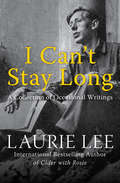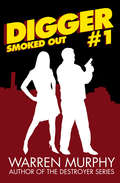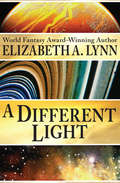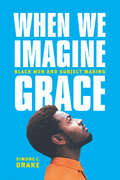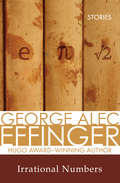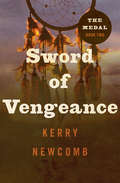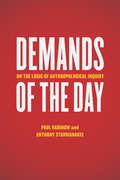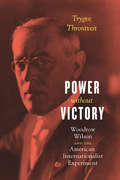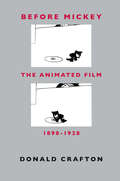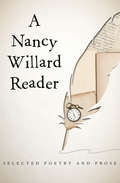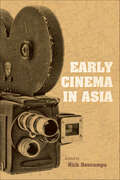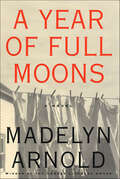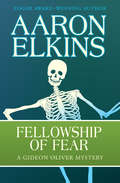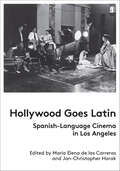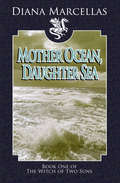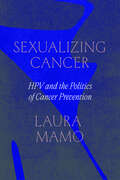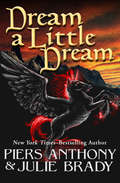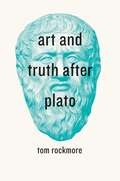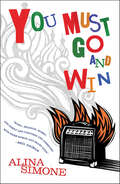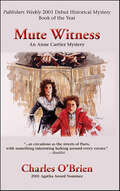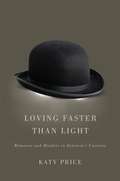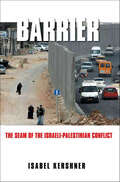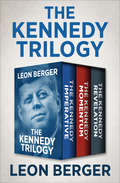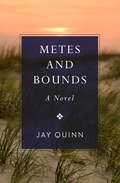- Table View
- List View
I Can't Stay Long (Penguin Modern Classics Ser.)
by Laurie LeeThe essential Laurie Lee, a collection of occasional writings full of his unique vision and irresistible charm All of the wit and wisdom and poetry that made Laurie Lee one of the most celebrated English writers of the twentieth century can be found in this compilation of &“first loves and obsessions.&” In Part One, Lee revisits his idyllic boyhood in the Cotswolds village made famous by his bestselling autobiography, Cider with Rosie. In Part Two, he turns his attention to an earnest consideration of abstract concepts such as the power of charm, the pleasures of appetite, and the meaning of paradise. And in the final and longest section, the author of the acclaimed Spanish travelogues As I Walked Out One Midsummer Morning and A Rose for Winter tells the stories of his many other journeys—from sun-dappled Tuscany to melancholy Warsaw to the enchanting and exotic Sugar Islands of the Caribbean.
Smoked Out (Digger #1)
by Warren MurphyIn Smoked Out, Digger crashes a funeral to find out whether the death of a doctor&’s wife was an accident . . . or murder.
A Different Light
by Elizabeth A. LynnA man makes the ultimate sacrifice to find the man he loves in this &“magical . . . entertaining cross-genre tale&” from the World Fantasy Award–winning author (Library Journal). In the future, cancer has been eliminated on Earth. Despite his diagnosis, celebrated artist Jimson Alleca can live peacefully for another twenty years if he stays on the planet to receive his medication. But Jimson does not want peace; he wants love. Even though it will shorten his lifespan, giving him one single year more, Jimson leaves space-normal to enter &“the Hype,&” a shimmering space outside of space. He goes in search of his former lover, the star captain Russell O&’Neill. What he finds is enough adventure and freedom to fill a lifetime. With A Different Light, author Elizabeth A. Lynn has changed the face of science fiction by depicting a homosexual relationship not as taboo or fantastical but as a normal aspect of everyday life, around which the fantasy and adventure gets built. Since the novel&’s first publication in 1978, readers have loved its depth of prose, its clarity of emotion, and its thrilling adventure. It is no wonder Lynn is a multiple World Fantasy Award–winning writer whose work author George R. R. Martin called &“lyrical and literate, and a treat from the first page to the last.&”
When We Imagine Grace: Black Men and Subject Making
by Simone C. DrakeSimone C. Drake spent the first several decades of her life learning how to love and protect herself, a black woman, from the systems designed to facilitate her harm and marginalization. But when she gave birth to the first of her three sons, she quickly learned that black boys would need protection from these very same systems—systems dead set on the static, homogenous representations of black masculinity perpetuated in the media and our cultural discourse. In When We Imagine Grace, Drake borrows from Toni Morrison’s Beloved to bring imagination to the center of black masculinity studies—allowing individual black men to exempt themselves and their fates from a hateful, ignorant society and open themselves up as active agents at the center of their own stories. Against a backdrop of crisis, Drake brings forth the narratives of black men who have imagined grace for themselves. We meet African American cowboy, Nat Love, and Drake’s own grandfather, who served in the first black military unit to fight in World War II. Synthesizing black feminist and black masculinity studies, Drake analyzes black fathers and daughters, the valorization of black criminals, the black entrepreneurial pursuits of Marcus Garvey, Berry Gordy, and Jay-Z, and the denigration and celebration of gay black men: Cornelius Eady, Antoine Dodson, and Kehinde Wiley. With a powerful command of its subjects and a passionate dedication to hope, When We Imagine Grace gives us a new way of seeing and knowing black masculinity—sophisticated in concept and bracingly vivid in telling.
Irrational Numbers: Stories
by George Alec EffingerStories that &“belong to a world that has been shaped not only by Asimov and Heinlein but also by Borges, Pynchon and Barthelme&” (The New York Times). In IRRATIONAL NUMBERS, as with much of his work, author George Alec Effinger straddles the line between allegorical fantasy and science fiction. It&’s a vein Effinger mines for a deep, meaningful understanding of human nature. Challenging and disquieting in the way only the best fiction can be, this collection of eight magnificent pieces of fiction will have readers clamoring for more. George Alec Effinger was a true master of satirical Science Fiction. Before his death in 2002, he gained the highest esteem amongst his peers for his pitch-perfect stylistic mimicry and his great insight into the human condition. Despite a life filled with chronic illness, Effinger was a prolific novelist and short story writer, earning multiple Nebula and Hugo Award nominations.
Sword of Vengeance (The Medal #2)
by Kerry NewcombAs the War of 1812 roars around him, dauntless Kit McQueen fights for both his young country and his own honorAfter years of battling the pirates of the Barbary Coast, Kit McQueen is shipwrecked on his return voyage before washing ashore in the steamy jungle of Spanish Florida, where the Spanish capture him and sentence him to death. On the morning of his execution, a Choctaw army storms the Spanish camp, led by the fearsome Iron Hand O&’Keefe, an Irishman who has thrown in with the Indians. He saves McQueen&’s life, returning him to the United States to fight a new war.Pressed into the service of his young nation, Kit is sent to the last place he wanted to go: back to Indian country. His commitment to the cause wavers when he is given an order he cannot bear to fulfill—hunting down the Irish traitor who once saved his life.
Demands of the Day: On the Logic of Anthropological Inquiry
by Paul Rabinow Anthony StavrianakisDemands of the Day asks about the logical standards and forms that should guide ethical and experimental anthropology in the twenty-first century. Anthropologists Paul Rabinow and Anthony Stavrianakis do so by taking up Max Weber’s notion of the “demands of the day.” Just as the demand of the day for anthropology decades ago consisted of thinking about fieldwork, today, they argue, the demand is to examine what happens after, how the experiences of fieldwork are gathered, curated, narrated, and ultimately made available for an anthropological practice that moves beyond mere ethnographic description. Rabinow and Stavrianakis draw on experiences from an innovative set of anthropological experiments that investigated how and whether the human and biological sciences could be brought into a mutually enriching relationship. Conceptualizing the anthropological and philosophic ramifications of these inquiries, they offer a bold challenge to contemporary anthropology to undertake a more rigorous examination of its own practices, blind spots, and capacities, in order to meet the demands of our day.
Power without Victory: Woodrow Wilson and the American Internationalist Experiment
by Trygve ThrontveitFor decades, Woodrow Wilson has been remembered as either a paternalistic liberal or reactionary conservative at home and as a naïve idealist or cynical imperialist abroad. Historians’ harsh judgments of Wilson are understandable. He won two elections by promising a deliberative democratic process that would ensure justice and political empowerment for all. Yet under Wilson, Jim Crow persisted, interventions in Latin America increased, and a humiliating peace settlement was forced upon Germany. A generation after Wilson, stark inequalities and injustices still plagued the nation, myopic nationalism hindered its responsible engagement in world affairs, and a second vastly destructive global conflict threatened the survival of democracy worldwide—leaving some Americans today to wonder what, exactly, the buildings and programs bearing his name are commemorating. In Power without Victory, Trygve Throntveit argues that there is more to the story of Wilson than these sad truths. Throntveit makes the case that Wilson was not a “Wilsonian,” as that term has come to be understood, but a principled pragmatist in the tradition of William James. He did not seek to stamp American-style democracy on other peoples, but to enable the gradual development of a genuinely global system of governance that would maintain justice and facilitate peaceful change—a goal that, contrary to historical tradition, the American people embraced. In this brilliant intellectual, cultural, and political history, Throntveit gives us a new vision of Wilson, as well as a model of how to think about the complex relationship between the world of ideas and the worlds of policy and diplomacy.
Before Mickey: The Animated Film 1898–1928
by Donald CraftonThis witty and fascinating study reminds us that there was animation before Disney: about thirty years of creativity and experimentation flourishing in such extraordinary work as Girdie the Dinosaur and Felix the Cat. Before Mickey, the first and only in-depth history of animation from 1898-1928, includes accounts of mechanical ingenuity, marketing and art. Crafton is equally adept at explaining techniques of sketching and camera work, evoking characteristic styles of such pioneering animators as Winsor McCay and Ladislas Starevitch, placing work in its social and economic context, and unraveling the aesthetic impact of specific cartoons. "Before Mickey's scholarship is quite lively and its descriptions are evocative and often funny. The history of animation coexisted with that of live-action film but has never been given as much attention."—Tim Hunter, New York Times
A Nancy Willard Reader: Selected Poetry and Prose
by Nancy WillardSelections from Nancy Willard&’s acclaimed volumes of poetry and proseThis diverse collection features some of Nancy Willard&’s most critically lauded poetry—including works from her Newbery Medal–winning volume, A Visit to William Blake&’s Inn—as well as her short fiction and four unconventional essays on writing.Hens, children, magic bottles, and the moon are just some of the characters running through the luminous musings gathered here. &“How to Stuff a Pepper&” becomes a heady discourse on the thoughts and sleeping habits of peppers. &“The Doctrine of the Leather-Stocking Jesus&” and &“The Hucklebone of a Saint&” are tales about the power of superstition to shape our lives. Other stories showcase favorite Willard themes about God, religion, and the magic and mysticism in everyday life—and the ancestors, guardians, saints, and spirits who, in Willard&’s words, come back &“once in a while to keep an eye on us, the living.&”A paean to the power of storytelling, A Nancy Willard Reader is an essential volume for poetry and fiction lovers.
Early Cinema in Asia
by Nick DeocampoEarly Cinema in Asia explores how cinema became a popular medium in the world's largest and most diverse continent. Beginning with the end of Asia's colonial period in the 19th century, contributors to this volume document the struggle by pioneering figures to introduce the medium of film to the vast continent, overcoming geographic, technological, and cultural difficulties. As an early form of globalization, film's arrival and phenomenal growth throughout various Asian countries penetrated not only colonial territories but also captivated collective states of imagination. With the coming of the 20th century, the medium that began as mere entertainment became a means for communicating many of the cultural identities of the region's ethnic nationalities, as they turned their favorite pastime into an expression of their cherished national cultures. Covering diverse locations, including China, India, Japan, Philippines, Malaysia, Thailand, Iran, and the countries of the Pacific Islands, contributors to this volume reveal the story of early cinema in Asia, helping us to understand the first seeds of a medium that has since grown deep roots in the region.
A Year of Full Moons: A Novel
by Madelyn ArnoldLambda Award winner Madelyn Arnold combines history, class, sex, and family inA Year of Full Moons, a tour-de-force about the coming of age and coming into power of a young girl in a hardscrabble southern town during the early 1960s.Brilliant, tomboyish Josephine Margaret Butler--better known as Jos--is the second oldest child in a large, poor family living in provincial Summit, Kentucky, in 1963. After her mother has a miscarriage and retreats into herself, Jos and her sister Ellie have to run the household and take care of their five younger siblings and their decidedly eccentric, sometimes brilliant, and always difficult father. In the coming year, the nation's mounting tensions over civil rights and the Vietnam War finally begin to infiltrate Summit at the same time that Jos begins to act upon her secret passion for women. Trapped in a damaging family dynamic and in a town that is violently resisting the sweeping social changes of the outside world, Jos realizes that only one thing--her intellect--can provide a means of escape.
Organic Avenue: Recipes for Life, Made with LOVE*
by Denise Mari Leda ScheintaubReplicate the go-to cleanse for Hollywood A-listers at home with this beautifully designed, lavishly illustrated, and inspiring lifestyle book by Denise Mari, founder of Organic Avenue, the hugely popular juice cleansing and raw vegan lifestyle company.Denise Mari, founder of Organic Avenue, went from peddling her fresh juices from a backpack in the Lower East Side of New York to opening a booming business and brand. Her delicious, sustainable, and compassionate food has become a favorite of stars like Gwyneth Paltrow, Jennifer Aniston, and Meg Ryan. Now, through this stunning book, her fabulous juice cleanse programs and nutritious, mouthwatering food will be available to readers who care about being healthy inside and out. Enjoy the juices, elixirs, soups, smoothies, salads, entrees, snacks, and desserts—all using pure, nutrient-rich, organic, and raw ingredients—that have transformed Organic Avenue into one of today's hottest brands.But Organic Avenue isn't just about eating. It's about living. Mari tells the moving story behind her brand's healthy philosophy and shares its ideals—sustainability, compassion, dedication to uncompromising quality, and holistic living—offering suggestions everyone can use to detoxify their bodies and transform their lifestyles to become happier, healthier, thinner and more energized, focused, balanced, and inspired.Illustrated with dozens of gorgeous, full-color photos and beautifully crafted Organic Avenue includes adaptable cleanse programs for bright eyes and glowing skin, weight loss, improved stamina, positive thinking, inner calmness, and mental clarity. Feel good and live well with DIY access to Organic Avenue's never-before-published recipes and philosophy for living.
Fellowship of Fear: Fellowship Of Fear, The Dark Place, Murder In The Queen's Armes, And Old Bones (The Gideon Oliver Mysteries #1)
by Aaron ElkinsFirst in the Edgar Award–winning series &“that never disappoints,&” featuring the forensic anthropologist known as the Skeleton Detective (The Philadelphia Inquirer). When anthropology professor Gideon Oliver is offered a teaching fellowship at US military bases in Germany, Sicily, Spain, and Holland, he wastes no time accepting. Stimulating courses to teach, a decent stipend, all expenses paid, plenty of interesting European travel . . . What&’s not to like? It does not take him long to find out. On his first night, he is forced to fend off two desperate, black‑clad men who have invaded his Heidelberg hotel room with intent to kill. And then there are a few trivial details that the recruiting agency forgot to mention—such as the fact that the two previous holders of the fellowship both met with mysterious ends. From there, it is all downhill. Gideon finds himself the target in an unfamiliar game for which no one has bothered to give him the rules. What he does have is his own considerable intellect and his remarkable forensic skills. He will need them, for he is playing for some fairly high stakes: the security of Western Europe. Fellowship of Fear is the 1st book in the Gideon Oliver Mysteries, but you may enjoy reading the series in any order.
Hollywood Goes Latin: Spanish-Language Cinema in Los Angeles
by María Elena de las Carreras and Jan-Christopher HorakIn the 1920s, Los Angeles enjoyed a buoyant homegrown Spanish-language culture comprised of local and itinerant stock companies that produced zarzuelas, stage plays, and variety acts. After the introduction of sound films, Spanish-language cinema thrived in the city's downtown theatres, screening throughout the 1930s, 1940s, and 1950s in venues such as the Teatro Eléctrico, the California, the Roosevelt, the Mason, the Azteca, the Million Dollar, and the Mayan Theater, among others. With the emergence and growth of Mexican and Argentine sound cinema in the early to mid-1930s, downtown Los Angeles quickly became the undisputed capital of Latin American cinema culture in the United States. Meanwhile, the advent of talkies resulted in the Hollywood studios hiring local and international talent from Latin America and Spain for the production of films in Spanish. Parallel with these productions, a series of Spanish-language films were financed by independent producers. As a result, Los Angeles can be viewed as the most important hub in the United States for the production, distribution, and exhibition of films made in Spanish for Latin American audiences. In April 2017, the International Federation of Film Archives organized a symposium, "Hollywood Goes Latin: Spanish-Language Cinema in Los Angeles," which brought together scholars and film archivists from all of Latin America, Spain, and the United States to discuss the many issues surrounding the creation of Hollywood's "Cine Hispano." The papers presented in this two-day symposium are collected and revised here.This is a joint publication of FIAF and UCLA Film & Television Archive.
Mother Ocean, Daughter Sea (The Witch of Two Suns #1)
by Diana Marcellas"Mother OceanDaughter SeaStrength UnchangingStrengthen Me"The Shari'a are an ancient race. They are un-warlike and they are ruled by their shamanic witches. The Allemanii are more recently arrived in their locale and are both awed and made fearful by the magical powers of the witches. After generations of peaceful coexistence, a cataclysm occurred out of nowhere and the Allemanii turned on their neighbors and hosts, slaughtered most of them and scattered the survivors. Suddenly, to be a Shari'a is proscribed and to be caught practicing their magic is to be hunted to the death.In MOTHER OCEAN, DAUGHTER SEA, Brierly, thinking herself to be the last of her long-lost kind, practices the forbidden ancient healing art at constant risk of her life. Execution is the penalty if she is caught but her need to help those who are themselves in need is stronger than any fear for her own safety. "If I am the last, I will be a flame to the end." But her attempt to save the wife of a nobleman sworn to wipe out her kind plunges her into a conspiracy of deceit and a hidden power struggle more deadly than anything she has ever known. Her fight for survival may lead her to a love for the ages and, perhaps, to discover the surviving remnants of her people--if she lives.
Sexualizing Cancer: HPV and the Politics of Cancer Prevention
by Laura MamoThe virus that changed how we think about cancer and its culprits—and the vaccine that changed how we talk about sex and its risks. Starting in 2005, people in the US and Europe were inundated with media coverage announcing the link between cervical cancer and the sexually transmitted virus HPV. Within a year, product ads promoted a vaccine targeting cancer’s viral cause, and girls and women became early consumers of this new cancer vaccine. An understanding of HPV’s broadening association with other cancers led to the identification of new at-risk populations—namely boys and men—and ignited a plethora of gender and sexual issues related to cancer prevention. Sexualizing Cancer is the first book dedicated to the emergence and proliferation of the HPV vaccine along with the medical capacity to screen for HPV—crucial landmarks in the cancer prevention arsenal based on a novel connection between sex and chronic disease. Interweaving accounts from the realms of biomedical science, public health, and social justice, Laura Mamo chronicles cervical cancer’s journey out of exam rooms and into public discourse. She shows how the late twentieth-century scientific breakthrough that identified the human papilloma virus as having a causative role in the onset of human cancer galvanized sexual politics, struggles for inclusion, new at-risk populations, and, ultimately, a new regime of cancer prevention. Mamo reveals how gender and other equity arguments from within scientific, medical, and advocate communities shaped vaccine guidelines, clinical trial funding, research practices, and clinical programs, with consequences that reverberate today. This is a must-read history of medical expansion—from a “woman’s disease” to a set of cancers that affect all genders—and of lingering sexualization, with specific gendered, racialized, and other contours along the way.
Dream a Little Dream: A Tale Of Myth And Moonshine
by Piers Anthony Julie Brady&“[A] fantasy adventure that uses the quixotic nature of dreams as a background for a modern-day pilgrimage of hope.&” —Library Journal Nola and Tina are both girls with problems. They don&’t know each other yet, but they will, because each is a Creator, with the magical ability to turn dreams into reality. It would be a great gift and a great power—if either knew she had it. But this world is hard on dreamers, whether they dream true or not. Nola is trapped in a terrible, abusive relationship with a man she once loved; Tina is an orphan who makes her living on the street. All their dreams are slowly being ground into dust. It&’s a common enough tragedy, a sorrow and a grief and a shame upon the world, no matter whom it happens to. But when dreams themselves die, when the great dreamers stop dreaming, whole universes of imagination are lost. And the land of Nola and Tina&’s dreams is fighting back. Into their miserable everyday world soars Esprit, a winged unicorn dark as the space between the stars. He is the vessel of Nola&’s dreams, come to aid her in her battle with sordid reality. Following after him comes Prince Michael, whose quest it is to find the human dreamers who can save his land from ruin.
Art and Truth after Plato
by Tom RockmoreDespite its foundational role in the history of philosophy, Plato’s famous argument that art does not have access to truth or knowledge is now rarely examined, in part because recent philosophers have assumed that Plato’s challenge was resolved long ago. In Art and Truth after Plato, Tom Rockmore argues that Plato has in fact never been satisfactorily answered—and to demonstrate that, he offers a comprehensive account of Plato’s influence through nearly the whole history of Western aesthetics. Rockmore offers a cogent reading of the post-Platonic aesthetic tradition as a series of responses to Plato’s position, examining a stunning diversity of thinkers and ideas. He visits Aristotle’s Poetics, the medieval Christians, Kant’s Critique of Judgment, Hegel’s phenomenology, Marxism, social realism, Heidegger, and many other works and thinkers, ending with a powerful synthesis that lands on four central aesthetic arguments that philosophers have debated. More than a mere history of aesthetics, Art and Truth after Plato presents a fresh look at an ancient question, bringing it into contemporary relief.
You Must Go and Win: Essays
by Alina SimoneIn the wickedly bittersweet and hilarious You Must Go and Win, the Ukrainian-born musician Alina Simone traces her bizarre journey through the indie rock world, from disastrous Craigslist auditions with sketchy producers to catching fleas in a Williamsburg sublet. But Simone offers more than down-and-out tales of her time as a struggling musician: she has a rapier wit, slashing and burning her way through the absurdities of life, while offering surprising and poignant insights into the burdens of family expectations and the nature of ambition, the temptations of religion and the lure of a mythical Russian home. Wavering between embracing and fleeing her outsized and nebulous dreams of stardom, Simone confronts her Russian past when she falls in love with the music of Yanka Dyagileva, a Soviet singer who tragically died young; hits the road with her childhood friend who is dead set on becoming an "icon"; and battles male strippers in Siberia. Hailed as "the perfect storm of creative talent" (USA Today, Pop Candy), Simone is poised to win over readers of David Rakoff and Sarah Vowell with her irresistibly funny and charming literary debut.
Mute Witness (Anne Cartier Mysteries)
by Charles O'BrienA London vaudeville actress travels to Paris to investigate her stepfather&’s involvement in an alleged murder suicide in historical mystery series debut. The years just prior to the French Revolution were filled with conflict, although many chose to ignore the signals of the coming storm. The Palais-Royal was the scene of much gaiety and a constant round of pleasures—perfect cover for darker activities such as the murder of a Parisian actress. That same evening, her lover, Antoine Dubois, died in a fatal fall. Was his death a guilt-induced suicide? Soon word of Antoine&’s death reaches his stepdaughter, Anne Cartier, a young vaudeville actress with the Sadler&’s Wells company in London. She enlists the aid of the messenger, Colonel Paul de Saint-Martin, and his adjutant, Georges Charpentier, to cross with her to France to investigate. While in Paris, Anne, who is skilled in signing for the deaf, befriends Michou, a deaf, illiterate seamstress with a talent for puppetry. Michou gives Anne an entrée into the Palais-Royal, where her quest broadens to include an amateur theatrical society of dissolute young noblemen and several suspicious officials. Hoping to learn more, Anne agrees to appear at a chateau to act the part of an exotic queen in Indian costume. But when priceless jewelry disappears and its owner, an aged count, is murdered, a venal police inspector threatens to derail Anne&’s whole project. . . . Praise for Mute Witness &“The bar for historical mysteries has just been raised, thanks to this masterly debut novel. . . . This is a truly wonderful first novel elegantly written, complex in both its characters and its plotting, and wearing the author&’s scholarship and erudition lightly. . . . This is great stuff; please, may we have more?&” —Publishers Weekly&“The plot is as circuitous as the streets of Paris, with something interesting lurking around every corner. The bold actress/teacher makes an intriguing heroine, and the pre-revolution period proves particularly hospitable as the backdrop for a mystery series. An auspicious debut.&” —Booklist
Loving Faster than Light: Romance and Readers in Einstein's Universe
by Katy PriceIn November 1919, newspapers around the world alerted readers to a sensational new theory of the universe: Albert Einstein’s theory of relativity. Coming at a time of social, political, and economic upheaval, Einstein’s theory quickly became a rich cultural resource with many uses beyond physical theory. Media coverage of relativity in Britain took on qualities of pastiche and parody, as serious attempts to evaluate Einstein’s theory jostled with jokes and satires linking relativity to everything from railway budgets to religion. The image of a befuddled newspaper reader attempting to explain Einstein’s theory to his companions became a set piece in the popular press. Loving Faster than Light focuses on the popular reception of relativity in Britain, demonstrating how abstract science came to be entangled with class politics, new media technology, changing sex relations, crime, cricket, and cinematography in the British imagination during the 1920s. Blending literary analysis with insights from the history of science, Katy Price reveals how cultural meanings for Einstein’s relativity were negotiated in newspapers with differing political agendas, popular science magazines, pulp fiction adventure and romance stories, detective plots, and esoteric love poetry. Loving Faster than Light is an essential read for anyone interested in popular science, the intersection of science and literature, and the social and cultural history of physics.
Barrier: The Seam of the Israeli-Palestinian Conflict
by Isabel KershnerIn this moving account of the barriers between Israelis and Palestinians, leading Israeli journalist Isabel Kershner traces the route of the wall Israel is building and reports its profound effects on people living on both sides.Kershner provides rich and insightful portraits of Israeli settlers feeling abandoned on the wrong side of the fence; Palestinian farmers angry at being cut off from their lands and groves; Arab families split up in a town now divided by the barrier; and Israelis protesting that it is an obstacle to peace. Exploring the reasons for the barrier and its political and moral implications, Kershner focuses on the people committed to their causes. As the future relationship between Israelis and Palestinians is being determined, Barrier: The Seam of the Israeli-Palestinian Conflict is an important book that addresses one of the most controversial solutions.
The Kennedy Trilogy: The Kennedy Imperative, The Kennedy Momentum, and The Kennedy Revelation (The Kennedy Trilogy #2)
by Leon BergerThree political thrillers from an &“immensely engaging&” author, inspired by the most dramatic events of the JFK years (Time). The Kennedy Trilogy is a political thriller series based on the three major crises of the Kennedy era—Berlin, 1961; Cuba, 1962; and Dallas, 1963—as witnessed factually in the Oval Office and fictionally by a young CIA agent. The complete edition contains all three books: The Kennedy Imperative (Berlin, 1961): In this exciting political thriller, factual events are interwoven in an exciting fictional plot. While the construction of the Berlin Wall challenges JFK with the first major crisis of his presidency, young CIA agent Philip Marsden is sent into East Berlin on his first mission. While the tanks face off at Checkpoint Charlie, he uncovers the difficult truth about his Russian-born mother. The Kennedy Momentum (Cuba, 1962): The Cold War reaches its zenith with the installation of Soviet nuclear missiles in Cuba threatening the United States. While JFK and his brother face deep divisions in trying to defuse the apocalyptic crisis, young CIA agent Philip Marsden is sent on a mission to the island where he is betrayed by a joint CIA-Mafia operation. The Kennedy Revelation (Dallas, 1963): In the immediate aftermath of the JFK assassination, the shock is multiplied for young CIA agent Philip Marsden when he learns of the death of his Cuban American wife. As evidence builds and the threats begin to mount, he discovers that the two tragedies might not be unrelated.
Metes and Bounds: A Novel (Southern Tier Ser.)
by Jay QuinnIn Metes and Bounds, surf, sand, and sex meet in the macho world of construction workers. For narrator Matt, &“the greatest comfort of surfing comes in the sureness and instinct.&” Matt is not just coming of age, he&’s coming out, and in the sun-bleached world of the North Carolina beaches his burgeoning sexuality can toss as many curves as a wave. Through his longings and self-discovery, Matt knows he cannot let others triumph over being the man he knows to be. As he says, &“Being a surfer meant you got out, faced your own fears, and did it.&” So too does Matt, in this stirring, memorable novel. Jay Quinn&’s Lambda-nominated books transcend the traditional gay novel, exploring universal issues of marriage, aging parents, addiction, and attraction, all while presenting unique characters and page-turning drama.
